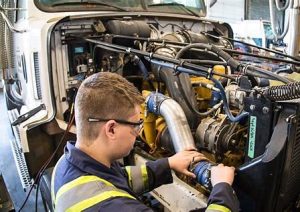How to Become a Diesel Technician: Your Guide
Interested in engines and machinery and wondering how to become a diesel technician? Diesel technicians are trained professionals who diagnose, repair, and maintain diesel engines in various vehicles and machinery. This guide outlines the steps, qualifications, training, and job prospects involved in how to become a diesel technician, as well as potential earnings, benefits, and tips for success.
Qualifications and Prerequisites: How to Become a Diesel Technician
How to become a diesel technician involves meeting specific qualifications and prerequisites, including educational requirements, skills and certifications, and physical fitness.
Educational Background:
Aspiring diesel technicians need a high school diploma or a GED. However, most employers prefer those who have completed a post-secondary diesel technology program. These programs provide a deep understanding of diesel engines, electrical systems, and other related components, all crucial for learning how to become a diesel tech.
Skills and Certifications:
Key skills for how to become a diesel mechanic include proficiency in mechanical tasks, troubleshooting, and problem-solving. Certifications, like the ASE certification, can enhance your credentials and validate your expertise.
Physical Stamina:
Becoming a diesel technician involves physical exertion, such as lifting heavy equipment, bending, kneeling, and standing for extended periods. Thus, good physical strength and stamina are crucial.
Training Pathways to Become a Diesel Technician
 Several training programs can equip you with the skills and knowledge required for a diesel technician role. They offer a blend of practical experience and theoretical knowledge of diesel technology.
Several training programs can equip you with the skills and knowledge required for a diesel technician role. They offer a blend of practical experience and theoretical knowledge of diesel technology.
How long does it take to become a diesel mechanic? Vocational schools or community colleges often provide comprehensive programs covering all aspects of diesel technology, like engine repair, electrical systems, and diagnostics. These programs can last between six months to two years, depending on your desired level of certification or degree.
Apprenticeship programs offer a combination of on-the-job training and classroom instruction. These programs typically last between one to four years and provide valuable experience under the tutelage of seasoned technicians while earning a wage.
Enrolling in an accredited training program ensures quality education that meets industry standards and often provides networking opportunities and job placement assistance upon completion.
Career Prospects for a Diesel Technician
As a diesel technician, you can anticipate a promising career with numerous opportunities. The field witnesses consistent demand for skilled professionals, offering a steady and secure career path.
Multiple career paths are available within the diesel technician field. You may choose to work in sectors like automotive, construction, transportation, or agriculture. Each sector poses unique challenges and growth opportunities.
With experience and further training, you can take on more specialized roles or management positions, overseeing a team of technicians, or even become a training instructor, imparting your knowledge to others.
Responsibilities and Tasks of a Diesel Technician
Diesel technicians play a vital role in the maintenance and repair of diesel engines. Some of their key responsibilities include:
Routine Maintenance: Regular maintenance tasks, such as oil changes, filter replacements, and fluid checks, are performed to ensure smooth engine operations.
Diagnostics and Repairs: Technicians diagnose engine issues using specialized equipment and expertise, and perform necessary repairs.
Electrical Systems: Technicians troubleshoot and repair any electrical problems, such as faulty wiring or malfunctioning sensors.
Fuel Systems: Technicians inspect and repair fuel systems, including fuel injectors, fuel pumps, and fuel lines to optimize engine performance.
Brake Systems: Technicians inspect, repair, and replace brake components, ensuring optimal braking performance.
Compensation and Benefits for Diesel Technicians
Understanding the salary and benefits associated with a diesel technician role is important. The average salary for diesel technicians in the United States ranges from $40,000 to $60,000 per year. Several factors influence salary levels, such as experience, location, and industry.
Beyond competitive salaries, diesel technicians often enjoy additional benefits like health insurance, retirement plans, paid time off, tuition reimbursement for continuing education, career advancement opportunities, and vehicle purchase or repair discounts. However, these benefits can vary based on the employer and location.
At Tracey Road Equipment, we offer comprehensive training programs and support for aspiring diesel technicians. Contact us today to learn more about how to become a diesel mechanic and the rewarding opportunities in this field.
Keys to Success in Becoming a Diesel Technician
 Here are some tips to help you excel as a diesel technician:
Here are some tips to help you excel as a diesel technician:
Professional Networking: Build relationships with experienced professionals, join industry associations, and attend industry events. Networking can open doors to new opportunities and keep you updated on industry trends.
Continuing Education: The diesel industry is constantly evolving. Staying competitive requires continued education and professional development. Consider specialized training programs, seminars, or certifications to enhance your skills.
Industry Updates: Stay informed about the latest industry advancements. Regularly check industry publications, websites, and forums for updates on new equipment, diagnostic tools, and repair techniques.
We are pleased to partner with BOCES for the Heavy Equipment and Diesel Technology Program. This is an opportunity for Tracey Road Equipment to provide an educational avenue for local students to learn a highly sought after skilled trade. This will provide TRE with a pipeline of trained and experienced young adults to potentially join our team after the program.
